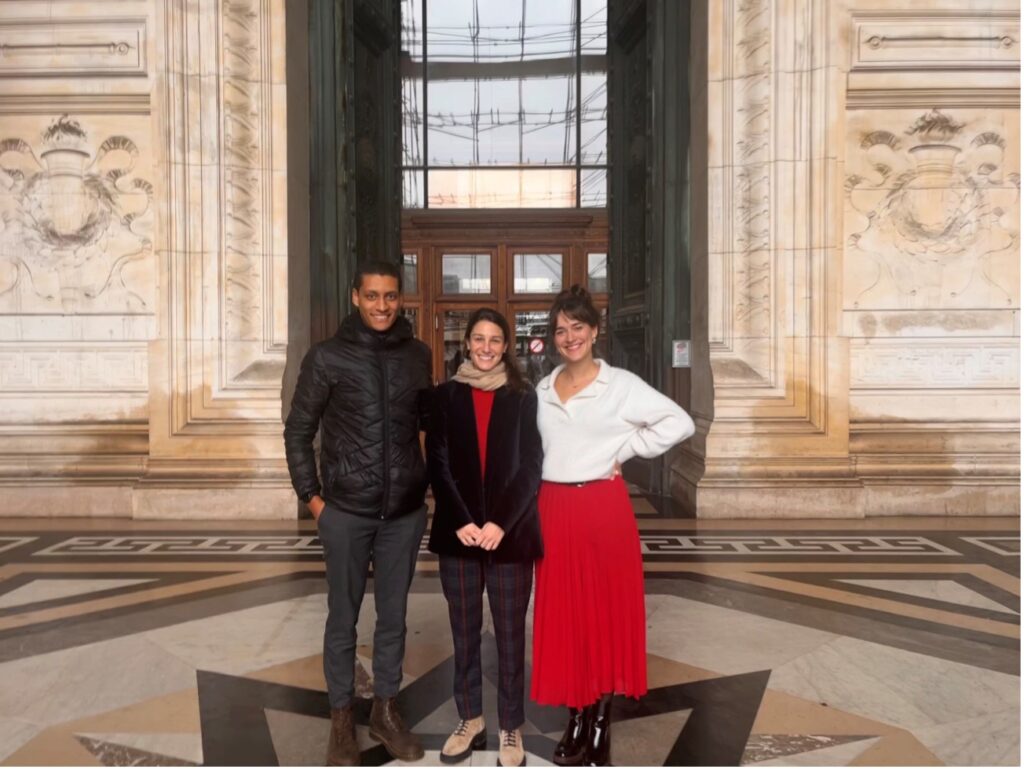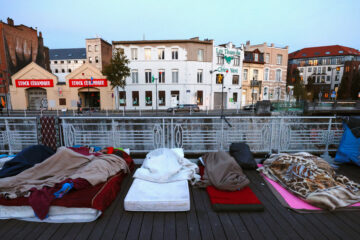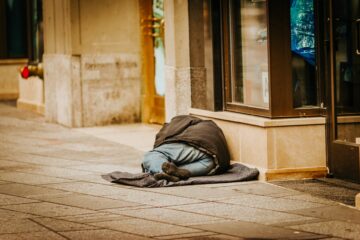For over a year now, several thousands of asylum seekers have been sleeping in the streets because of Belgium’s failure to provide them with a shelter and medical assistance, which they are legally entitled to under international and Belgian law. To help resolve this crisis, the BAJ (Bureau Aide Juridique), Vluchtelingenwerk Vlaanderen and several law firms set up the Legal Helpdesk in Brussels to support people seeking international protection in finding access to justice and access to shelter.
In a series of posts, we put a spotlight on the Legal Helpdesk that was created to coordinate a response to the crisis. In this interview, Margaux Bia provides us with a sneak peek behind the scenes of the Legal Helpdesk. Margaux is the pro bono lead lawyer at DLA Piper and responsible for their displaced people practice. As one of the co-founders of the helpdesk, she explains how she got involved in this project and why this work is so important to her specifically and to the community in general.
What does the Legal Helpdesk for asylum seekers do?
The legal helpdesk was created in April 2022 to provide legal assistance to people seeking international protection in Belgium. We have assisted 5000 visitors since the helpdesk opened its doors, mainly single men from Afghanistan, Syria, Ethiopia and Burundi. All of them come with the same legal issue: the lack of accommodation and medical assistance during their entire asylum procedure.
Every weekday afternoon volunteers from 35 law firms and universities across the country come to the legal helpdesk to provide first line legal assistance to the people that have been denied access to a shelter. We provide information on the asylum procedure and refer the applicants to NGOs who provide emergency services such as food, clothes, and urgent medical assistance. The main goal of the helpdesk is to apply for legal aid for each applicant and connect them with an immigration lawyer who can initiate the judicial procedure before the labour court to obtain reception conditions. In order to have a lawyer appointed, the legal helpdesk has been cooperating with several legal aid offices (e.g., BAJ Bruxelles (“Bureau d’Aide Juridique du Barreau de Bruxelles”), BJB from Antwerp, Brussel and Leuven (“Bureau Juridische Bijstand van de Balie Antwerpen, Brussel en Leuven”)). Once a lawyer is appointed through the regular pro deo system, they will start an urgent procedure before the labour court that will in most cases order Fedasil to provide shelter to the asylum seeker.
How did you come up with the idea of the legal helpdesk?
Early March 2022, LDIA (Legal Diversity and Inclusion Alliance) and other legal actors wanted to set up a helpdesk to assist people fleeing Ukraine. However, it turned out that because of the temporary protection directive, people fleeing Ukraine would receive a valid permit to come and remain in Belgium and be granted access to social services. Apparently, the bottleneck laid elsewhere.
We conducted a rapid assessment of the legal needs of displaced people arriving in Belgium and realised that thousands of people arriving every month in Belgium from Afghanistan, Syria, Burundi, Eritrea, Turkey or Palestine to seek refugee were left without shelter since October 2021. Although the Belgian law of 12 January 2007 provides for reception conditions including a shelter to every person applying for asylum and for the duration of the procedure, in practice the reception network is saturated and the timeframe to be invited to a center went from 2 weeks to 5 months. We created the helpdesk in response to the reception crisis in Belgium and have assisted 5000 asylum seekers to this date.
Who did you cooperate with to start the helpdesk?
The first thing we had to do was to map the needs on the ground and identify the stakeholders already engaged and look how they can join forces to have a bigger impact. Vluchtelingenwerk Vlaanderen was instrumental in the set-up of the legal helpdesk as they have been working with asylum seekers for a long period and understand their needs and priorities.
Thanks to the help of the BAJ, a venue was found and very quickly lawyers such as Jean-Francois Gerard (Freshfields), Ana Sofia Walsh (Fragomen), Claire Devillez (Dayez) and Byron Maniatis (Steptoe) took a coordinating role to help develop the helpdesk project.
From the start the helpdesk had a broad outreach with over 250 volunteers from 35 different law firms and 40 students from ULB, UCL, KUL and UGent.
In the beginning, many practical matters needed to be dealt with. There was a need to coordinate the shifts, to find interpreters, to check availabilities and train volunteers, to follow-up with immigration lawyers, to create a database, to launch advocacy and strategic litigation work.
More importantly, our role was to ensure a direct client relationship between the immigration specialists (second line lawyers) and ensure that the applicants would understand all the steps in the procedure.
What were your own personal motives to lead this initiative and convince other lawyers and partners to join this project?
I always wanted to change the narrative around migrants, asylum seekers and refugees. They all have a different story and different reasons to have fled their country leaving everything behind or looking for a better life. They are rights holders like any other person in need of legal help. As a lawyer, my aim is to protect their rights under national and international law, advocate for more protective legislation and facilitate their inclusion.
I have been working on projects to help displaced people in Lebanon, Gambia and across Europe. It is the first time that I am working on a project where people are being affected in my own country. People coming to the helpdesk share pictures of their spot at a train station where they spent the night, share stories about aggression and violence in the streets, explain when they last had a decent dinner and that they have been wearing the same clothes for weeks. They are trying to understand why it takes 5 months in Belgium to have a roof over their heads. Working at the helpdesk brings some clarity about how serious and devastating the situation is and highlights the role of a lawyer to support people in such vulnerable positions.
Everyone involved at the helpdesk has been using their expertise, time and network to help these right holders in one way or another. We also provide a space for asylum seekers to feel safe, seen and heard.
In terms of human rights violations, what is at stake in this reception crisis?
Some call it the crisis of the rule of law more than a reception crisis. What lawyers and advocates are highlighting is the non-enforcement of courts decisions by the Belgian state. More than 7000 court decisions have ordered Fedasil to provide shelter to an asylum seeker, but sometimes it takes up to four months for Fedasil to comply with such an order. Not only single men, but families and minors, too, have slept in the streets for at least a few weeks.
Belgium has failed to comply with international law and court decisions. The purpose of the helpdesk is not to determine whether asylum seekers have the right to stay in Belgium or not. The helpdesk was created to protect the rights of those who are affected by the lack of application of the laws that the state has adopted. We advocate for the respect of these laws and treaties. We see that Fedasil is now allocating a center for applicants who received a positive decision from the labour court back in August or September. That means that some people have been living in the streets since July. It is unthinkable and very hard to explain to a client that even with a court decision in their favour, they will still need to wait for 4, 5 or 6 months before they will find shelter.
Why are most asylum seekers who are looking for help at the legal helpdesk young, single men? What is your reflection on gender aspects in this pro bono initiative?
Well, it is a tough question but that is the reality we are confronted with. Fedasil prioritizes families, single women, minors and people with severe medical conditions, except in September and October when no center could be found for them either. It is our job at the helpdesk to identify other people who are at risk and particularly vulnerable. We will refer members of the LGBTQ+ community or victims of torture and trafficking to the right NGOs who provide them with special assistance and accommodation. But, again, a first medical and psycho-social check-up of the persons applying for international protection is part of the primary responsibility of the hosting government.
How would you describe the added value for the legal profession and lawyers participating in such initiative?
You tell me. Besides the fact that you are helping people who are in dire need, you are also engaging with the reality of how people are treated in your own city and your country. It reminds you that we all have a role to play in order to solve a crisis. We cannot pretend that we do not know this anymore, it is all over the news. Joining such a project is also about meeting amazing co-workers and volunteers who are willing to work hard to find solutions, try new strategies, find more support. It is great working with people who have the same objective in mind and will bring different ideas and insights to achieve it.
Through the legal helpdesk, lawyers can demonstrate their skills as it forces you to adapt and be pragmatic in various difficult circumstances while simultaneously facing systemic barriers. You learn to be flexible and work independently, come up with effective and quick solutions. This experience can only make you a better lawyer.
What are the setbacks (costs, lost opportunities, burdens…) that you experience or identified during the past year?
There have been some setbacks in the past year. The initial plan was to have the helpdesk for only three months, from April until June 2022, but we are still here and there is no long-term solution in sight. Which means that in some way and despite all our efforts, we have failed, and the current situation is definitely not what we expected when starting the helpdesk.
We have considered stopping the helpdesk, but the question is what would happen if we did. The only ones who would be directly affected are always the same: the asylum seekers who are already suffering too much. So, we decided to continue, because none of the BAJ or BJB are equipped to have interpreters or a rolling volunteer system in place. Without the helpdesk, we would be back in the old situation in which legal assistance was not coordinated and it would be every man for himself again. We do not know how long the helpdesk will be needed, but there are still between 2000-3000 people sleeping in the street today. It does not seem to be an insurmountable problem for the government to provide shelter for these people, but we will have to wait and see how things progress.
How can people that would be interested join this initiative?
We are always in need of more volunteers, so everyone with a legal background is free and very welcome to join. You can also join one of our working groups. One of these working groups is involved for example with procedures before the European court of Human Rights. Since October, the European Court of Human Rights ordered interim measures against Belgium for failing to offer material reception conditions to over 1100 asylum-seekers.
For those interested to join the initiative, please contact the helpdesk coordinators team at brusselslegalhelpdesk2022@gmail.com.

Tijd voor Mensenrechten biedt een platform aan mensenrechtenexperten, en gaat de kwaliteit van bijdragen na voor die op het platform verschijnen. Analyses en standpunten blijven niettemin de verantwoordelijkheid van de auteur.



0 reacties